
views
X
Research source
These are easy to write, but you should clarify ahead of time what your tenant needs. They might need a landlord reference letter, which is different.
Getting Details from Your Tenant

Ask who you're addressing the letter to. Get the person's name and their mailing address. You should mail the letter directly to the person instead of giving it to your tenant.

Find out what information to include. Does the tenant only need a letter stating the dates they rented from you? Or do they need more information? Clarify ahead of time what your tenant needs so that you are sure to include all of the information. For example, your tenant might need a landlord reference letter, which is different from a proof of residence. With a reference letter, you give your opinion about whether you would rent to the tenant again. Avoid providing information that isn't requested. For example, don't include information about the rent in your letter unless your tenant asks you to.
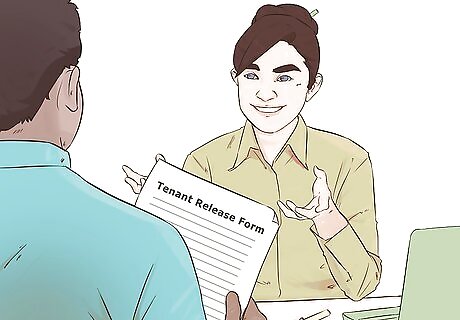
Get a signed release from your tenant. Some property management companies protect themselves by having tenants sign a release. In the release, the tenant identifies what information they want released and agree not to sue you for releasing it. Find a release used for employment references and adjust it to fit your circumstances.
Drafting a Proof of Residence Letter
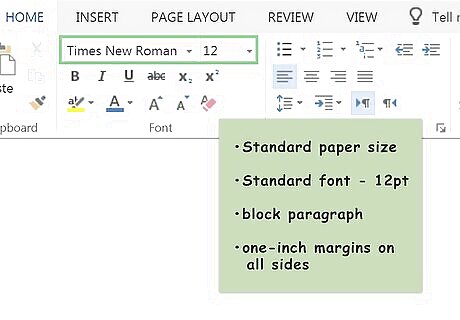
Format your letter. Set it up like a standard business letter. Open a blank word processing document and set the font to something legible, such as Times New Roman 12 point. Use letterhead if you have one. Be sure to leave enough space at the top.
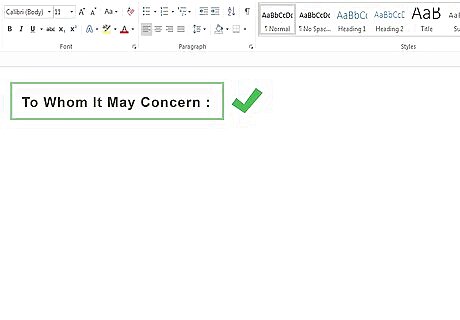
Include a salutation. A simple "Dear Mr/Ms/Mrs. [last name] will be adequate. If you don't know who you are sending the letter to, however, use “To Whom It May Concern.”
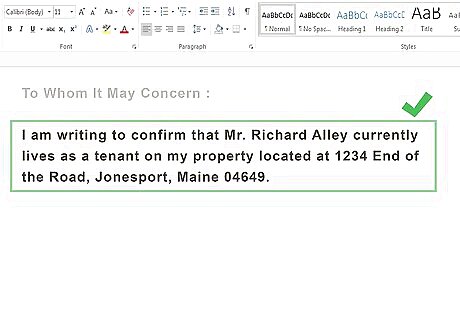
State the purpose of the letter. In the first paragraph, explain that you are writing to verify that the tenants live on your property. Also include the address where they live. For example, you can write, “I am writing to confirm that Mr. Richard Alley currently lives as a tenant on my property located at 1234 End of the Road, Jonesport, Maine 04649.”
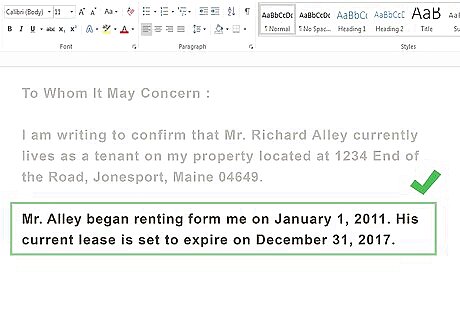
Identify the duration of the tenancy. You may also need to state how long someone has rented from you. You should include the dates and when the current lease expires. For example, you can write, “Mr. Alley began renting form me on January 1, 2011. His current lease is set to expire on December 31, 2017.”
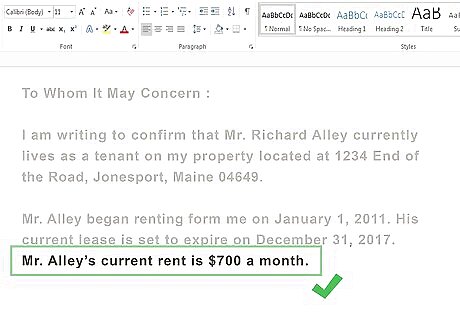
Provide additional information. Your tenants might want you to provide other information, depending on the circumstances. Include that information here, in its own paragraph. For example, you might need to include information on the rent. You can write, “Mr. Alley's current rent is $700 a month.”
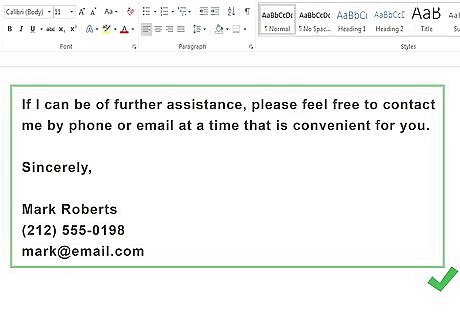
Close the letter. State that you can be reached by telephone to answer questions and include your phone number. Type “Yours Sincerely” and then include your name and signature. If you want, you can include your phone number and/or email address underneath your signature.
Writing a Landlord Reference Letter

Check if you had problems with your tenant. The purpose of a tenant reference letter is to inform a potential landlord about your tenant. For that reason, you should go through your records and check if you had any problems, such as the following: Timely rent. Was the tenant ever late with rent? If so, did they promptly pay or did you need to pester them? Complaints. Did another tenant complain about excessive noise or a pet? Tidiness. When you walked through the apartment, was it kept in neat condition? Did they notify you about repairs that were needed? You might need to enter the apartment, in which case you should give your tenant proper notice.

Avoid writing a negative reference. A negative reference will anger your tenant. Also, they might challenge its accuracy and claim they lost out on the place because of your reference. For this reason, you should decline to write a landlord reference if it can't be mostly positive. Be honest with the tenant. Say, “I don't think I can write a positive letter. Can you ask a previous landlord?” Also avoid lying in your reference letter. You might think this is a good way to get rid of a bad tenant. However, the future landlord might sue you for misrepresentation.
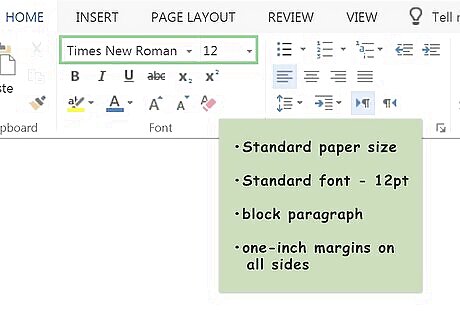
Set up your letter. Open a blank word processing document and set the font to Times New Roman 12 point or something similar. Your letter should be organized like a standard business letter. Use letterhead if you have it, and leave sufficient space up top. Use “To Whom It May Concern” as the salutation unless you know who you are addressing.
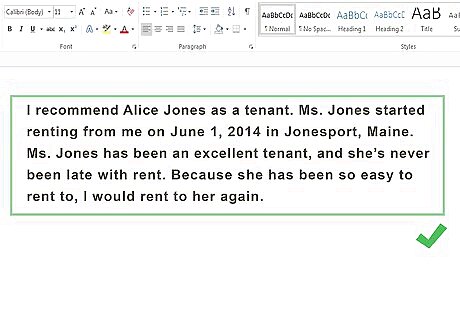
Explain the facts. Identify how long the tenant has rented from you and any other information your tenant wants included in the letter. You should also explain why you recommend the tenant. For example, you might write, “I recommend Alice Jones as a tenant. Ms. Jones started renting from me on June 1, 2014 in Jonesport, Maine. Ms. Jones has been an excellent tenant, and she's never been late with rent. Because she has been so easy to rent to, I would rent to her again.” Remember not to go overboard with praise. A landlord might think that you are trying to get rid of a problem tenant. Instead, use a neutral tone throughout the letter.
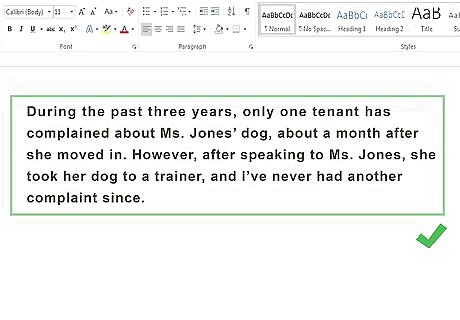
Put negative information in context. Few tenants are perfect, so it wouldn't be surprising if a tenant was late with the rent once or twice or had a complaint about excessive noise. You can identify any problems with your tenant, and then explain how they corrected the problem. For example, you can write, “During the past three years, only one tenant has complained about Ms. Jones' dog, about a month after she moved in. However, after speaking to Ms. Jones, she took her dog to a trainer, and I've never had another complaint since.”
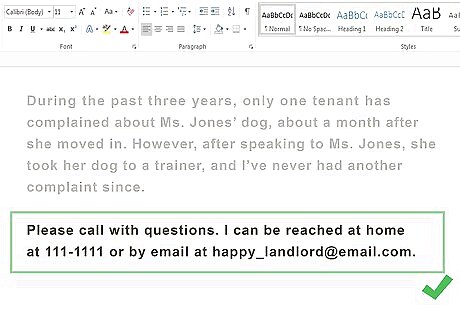
State you are willing to answer questions. In your final paragraph, tell the future landlord how to contact you. Include your email address and telephone number. For example, you can write, “Please call with questions. I can be reached at home at 111-1111 or by email at [email protected].”
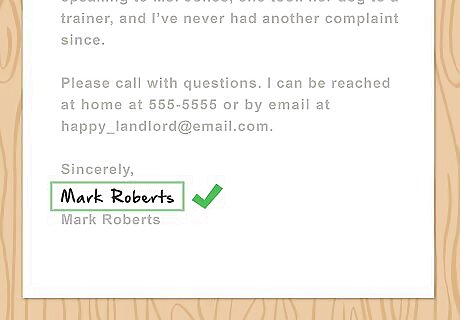
Sign the letter. Type “Sincerely” and leave several blank lines before typing your name. Sign your letter using an ink pen.
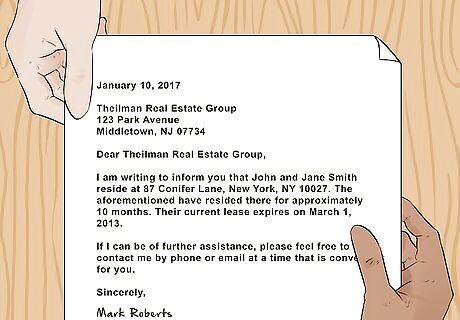
Show the tenant your letter. Give them a chance to review the letter before you send it off. If there's negative information in the letter, they might decide not to use it. Make a copy of the letter before mailing it.

















Comments
0 comment